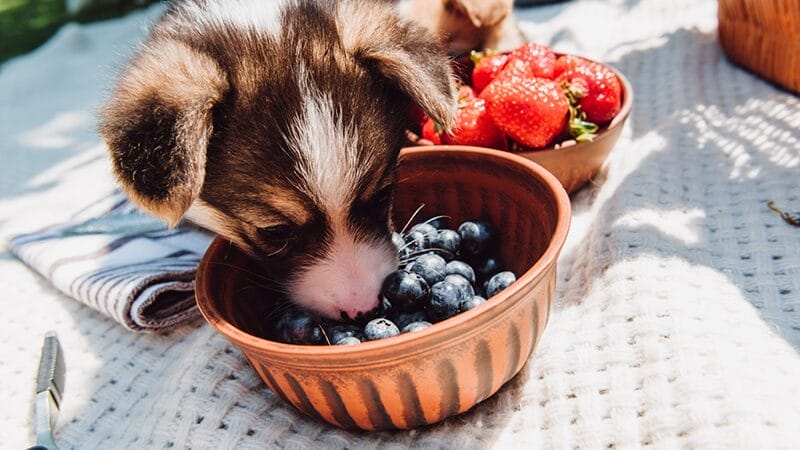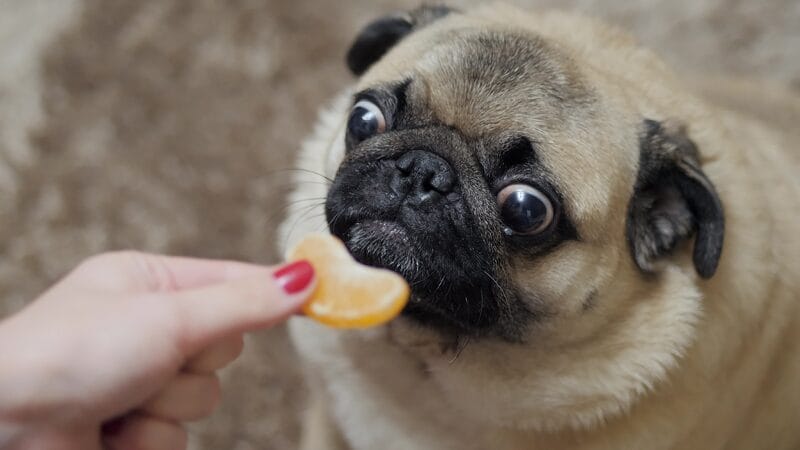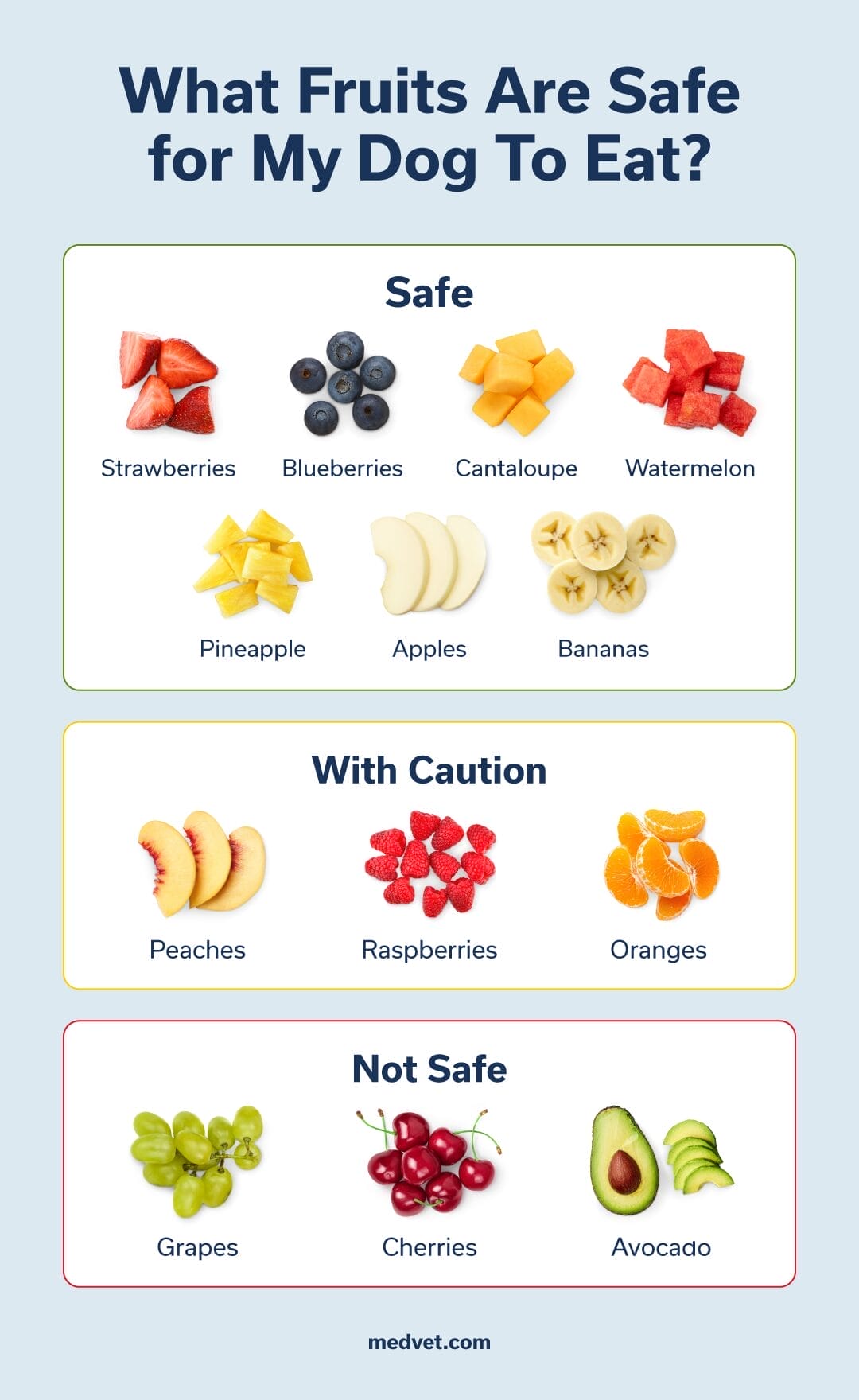
Which Fruits Are Safe for Your Dog to Eat?
Not all fruits are created equal when it comes to nutrition and safety. Learn which fruits are safe for your dog to eat.
Nothing says summer like fresh produce. Sweet, vine-ripened strawberries, mouth-watering melons, and juicy peaches are just a few of the fruits that tempt our taste buds when the temperature rises. Many of these summertime favorites can be shared as healthy treats for your dog, especially if they are prepared correctly. Fruits are often low in calories, provide additional vitamins and minerals, and can even help keep your dog hydrated.
However, not all fruits are created equally when it comes to nutrition and safety. Some can be downright dangerous. Read on to see which fruits your dog can eat. Are your favorites a “Yay,” a “Nay,” or somewhere in between for your canine companions? Even for safe fruits, remember to wash them well before sharing them with your pet.
Fruits Your Dog Can Safely Eat
Strawberries
Strawberries are high in fiber and vitamin C and are packed with antioxidants. They even contain an enzyme that can help whiten your dog’s teeth. However, they are higher in sugar, so they should be given in moderation. Make sure to wash them, remove the stems, and cut them into smaller pieces before sharing.
Blueberries
Blueberries are a superfood, rich in fiber and antioxidants that help prevent cell damage and strengthen the immune system. Their small size and low-calorie content make them an excellent substitute for dog biscuits or store-bought treats, especially when training your dog.
Cantaloupe
Cantaloupe is rich in nutrients like vitamins A, B6, and C, as well as niacin, folate, and potassium. It is low in calories but high in fiber and water content, making it a good treat for hydration. However, cantaloupe is higher in sugar, so it should be given in moderation, especially to diabetic dogs. Only the flesh of the cantaloupe should be shared. The rind is not digestible and can cause gastrointestinal blockage, so be sure to remove the fruit from the rind, scoop out the seeds, and cut the fruit into smaller pieces.
Watermelon
Watermelon is 92% water, making it a great treat to help keep your pet hydrated. It is also low in calories, contains no fat or cholesterol, and is high in potassium and vitamins A, B6, and C. To ensure it’s safe for your pup, remove the seeds and rind and only share the fleshy part of the fruit. The rind and seeds can cause intestinal blockages if ingested. You can also freeze small chunks of watermelon to create a refreshing treat on a hot day.
Pineapple
Pineapple is a great source of vitamins, minerals, and fiber. It also contains bromelain, an enzyme that helps dogs absorb proteins more easily. When feeding pineapple to your dog, give only the fleshy part of the fruit and dispose of the outside skin, core, and crown. Avoid canned pineapple, as it can be high in sugar.
Apples
Apples are a healthy treat for dogs, rich in vitamins A and C, as well as fiber. Fiber promotes healthy digestion, just like it does for humans. They are low in fat and calories, making them a great snack for dogs. Be sure to wash the apple thoroughly to remove any pesticide residue, or better yet, remove the skin. Always remove the seeds and core before sharing, as they can pose a choking hazard or cause an obstruction. Slicing the apple into small pieces can make it easier for your dog to eat and digest.
Bananas
Bananas are a good source of potassium, fiber, magnesium, and vitamins C and B6. They are low in calories, cholesterol, and sodium but higher in sugar, so they should be given in moderation. Peel the banana and cut it into small pieces to make it easier for your dog to eat. Bananas can be a great treat for dogs, especially when frozen for a cool, refreshing snack.

Fruits Dogs Can Enjoy with Caution
Raspberries
Raspberries are lower in sugar and calories and are high in fiber and a variety of vitamins and minerals. They also have anti-inflammatory properties that are beneficial for aging joints in older dogs or those with arthritis. However, raspberries contain a small amount of naturally occurring xylitol, which can be dangerous to your dog in larger quantities. Therefore, the key to sharing raspberries safely is to do so in small amounts.
Peaches
Peaches are a favorite in summer and are high in fiber and vitamin A, which can help fight infections. The fleshy part of the fruit is safe to share with your dog, but it’s important to remove the pit and dispose of it safely. Peach pits contain cyanide, which can be toxic to your dog if ingested.
Oranges
Oranges are a great source of vitamin C and other antioxidants, but they also have a stronger, bitter taste that your dog might not enjoy. The citric acid in the leaves, peel, seeds, and stem can be tough on your dog’s digestive system. While the fruit itself is not dangerous, the high sugar and acid content can lead to a minor upset stomach or other gastrointestinal issues.

Fruits You Should Never Feed Your Dog
Grapes and Raisins
Grapes and raisins are at the top of the “do not feed” list. While the exact substance that makes them dangerous to dogs is still unknown, they are extremely toxic. Ingesting grapes or raisins can lead to acute, sudden kidney failure. If your dog consumes either of these, contact your veterinarian immediately or take them to the nearest emergency veterinary clinic like MedVet.
Cherries
Although the fleshy part of the cherry is safe for dogs, the plant itself and the pit contain cyanide, which can be toxic if ingested. Cyanide disrupts the delivery of oxygen to the cells, making it dangerous for dogs. Because of their small size, separating the fruit from the pit can be difficult, so it’s best to avoid sharing cherries with your dog altogether. Signs of cyanide poisoning include dilated pupils, difficulty breathing, and red gums.
Avocados
The pit, skin, and leaves of an avocado contain a substance called persin, which can cause vomiting and diarrhea in dogs. While the fleshy part of the avocado has less persin, it still contains trace amounts. Therefore, it’s generally safer to keep avocados away from your dog to avoid any potential health issues.

Moderation is Key When Sharing Fruit with Your Dog
Every dog’s nutritional needs vary based on their age, weight, activity level, and any medical conditions. Consulting with your family veterinarian can help determine the appropriate amount of fresh fruits or vegetables that are suitable for your pet.
Even healthy fruits should be provided in moderation due to their higher sugar content. This is especially important if your dog is overweight or has diabetes. Additionally, introduce only one new food at a time and observe your pet for any negative or allergic food reactions.
If your dog ingests fruits that are not safe, contact your veterinarian immediately or visit the nearest MedVet.
Visit our Pet Care Resources library for more pet health and safety information.
FAQs
Is it safe to feed my dog fruits?
What fruits are safe to give my dog?
What should I do if my dog eats a dangerous fruit?
Contents


